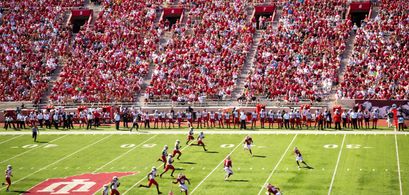Spread betting enables participants to predict whether the asset’s value, such as stocks or commodities, will rise or fall, thus making profits based on the accuracy of their prediction. Not only is spread betting common in finance, but it also plays a significant role in the sports betting world, where participants bet on points or goals rather than the outright winner.
This versatile form of betting is particularly appealing to investors and sports enthusiasts, as it introduces a range of strategies and bet types. In financial spread betting, participants speculate on market movements, including stocks, indices, and currencies, while in sports, they wager on point differences or specific player performances.
This allows for potentially significant returns and adds an element of excitement to the betting experience. However, it’s crucial to understand the associated risks and remain mindful of responsible gambling practices to ensure a positive experience.
Key Takeaways
Spread betting is a speculative strategy used in both financial markets and sports events.
It involves predicting the direction of an underlying asset or outcome, without ownership.
Multiple strategies and bet types are available, allowing for diversity and increased potential returns.
Understanding Spread Betting
Spread betting is a type of speculation that involves taking a bet on the price movement of a security, such as a stock or commodity, or a sports event outcome. Participants do not own the underlying asset, but rather speculate on whether the asset’s price will rise or fall, or if a team will win or lose by a certain margin. When it comes to sports, spread betting aims to even out odds between two teams, assigning a favorite (minus sign) and underdog (plus sign), along with a point spread. This section will cover point spread in NBA, moneyline and odds, and over/under totals.
Point Spread in NBA
In NBA spread betting, the point spread is a bookmaker’s way of giving one team a head start in a game, making the match more balanced. The favorite team is assigned a minus sign followed by a number, indicating how many points they must win by to cover the spread. The underdog, on the other hand, has a plus sign, showing how many points they can afford to lose by while still covering the spread.
For example:
Lakers (-7) vs. Celtics (+7)
In this case, the Lakers must win by more than 7 points, while the Celtics can lose by less than 7 points or win outright for the wager to succeed. If the Lakers win by exactly 7 points, it’s considered a push, and the bet is refunded.
Moneyline and Odds
The moneyline in spread betting refers to odds expressed in terms of a direct win/lose outcome for a particular team or player. Unlike point spread betting, the moneyline focuses on who will win the match outright, without considering any handicap or points given to either side. The favorite has a minus sign, indicating how much money needs to be wagered to win $100, while the underdog has a plus sign, showing the amount of profit earned from a $100 bet.
Example:
Lakers: -160
Celtics: +140
In this instance, if you bet $160 on the Lakers and they win, you would win $100. If you bet $100 on the Celtics and they win, you would win $140.
Over/Under Totals
Over/under totals in spread betting represent the total number of points, goals, or runs predicted for a specific game. Bettors can wager on whether the actual combined total will be higher (over) or lower (under) than the number set by the bookmaker. This type of betting takes both teams into account, so the bettor’s primary concern is the overall outcome, not which individual team comes out on top.
For example, if an NBA game’s over/under total is set at 215.5 points, you can bet on the combined score being more than 215.5 (over) or less than 215.5 (under). If the final combined score is exactly the set number, it’s considered a push and the bet is refunded.
Types of Sports in Spread Betting
Football (NFL and College Football)
In spread betting for both NFL and College football, the point spread is the most common type of bet. This involves predicting whether a team will win or lose by more than a specified number of points. A popular option during football season, spread betting allows bettors to capitalize on their knowledge of team performance and strategies.
Basketball (NBA, NCAAB)
Similar to football, spread betting in basketball (both NBA and NCAAB) relies on point spreads. However, basketball games tend to have higher scores, which can impact the size of the spreads. Bettors need to consider factors like team dynamics, injuries, and player matchups to make informed decisions when placing spread bets in basketball.
Baseball (MLB)
In MLB spread betting, the run line is utilized, which is usually set at 1.5 runs. This means that the favored team needs to win by at least two runs while the underdog can either win outright or lose by no more than one run for the bet to be successful. Baseball spread betting requires careful analysis of pitching performance, batting lineups, and team form.
Hockey (NHL)
NHL spread betting relies on the puck line, which is similar to baseball’s run line but typically set at 1.5 goals. Bettors need to predict if the favored team will win by at least two goals or if the underdog will either win outright or lose by no more than one goal. Key factors to consider include team form, defensive and offensive performance, and goaltending.
Soccer
Soccer spread betting revolves around goal lines, which can be whole numbers (like 1 or 2) or fractions (like 0.5 or 1.5). In soccer, the goal line represents the minimum number of goals that the favored team should win by for a successful bet. Bettors must consider various aspects such as team strength, playing styles, and individual player performance when placing spread bets in soccer.
Tennis
Tennis spread betting primarily focuses on the number of games a player will win by, known as the game line. Bettors need to predict if the favored player (or team in doubles) will win by more than the set line. Factors to consider include player form, head-to-head record, playing surface, and any potential injuries.
Golf
Spread betting in golf is usually centered around the total number of strokes a golfer will finish a tournament above or below a predetermined line. This requires a deep understanding of individual player performance, course difficulty, weather conditions, and current form to place informed spread bets.
Other Sports
Beyond the traditional sports, spread betting is also available for sports like NASCAR, MMA, UFC, NCAAF, Boxing, and more. Each sport comes with its own nuances and factors that bettors need to consider to increase their chances of accurately predicting spreads and outcomes. No matter the sport, maintaining a neutral and clear perspective is essential to successful spread betting.
Spread Betting Strategies and Tips
Understanding Line Movement and Odds
When it comes to spread betting strategies, it’s important to understand line movement and how odds are determined. Line movement refers to how the odds change over time leading up to a game or event. Oddsmakers adjust the lines to balance the action on both sides of the bet and manage their risk. Lines can also be influenced by betting trends, public sentiment, and news related to the event. A successful bettor should pay attention to these changes and aim to identify value in the lines at the right time.
Considering Injuries and Rest
Accounting for injuries and rest is another crucial element in spread betting. Injuries can significantly impact a team’s performance; hence, it’s essential to stay updated on injury reports and players’ availability. Additionally, monitoring rest schedules and considering factors like back-to-back games or long road trips can help bettors make more informed decisions on their bets.
Analyzing Matchups and Weather
In spread betting, analyzing matchups and weather plays a crucial role in predicting outcomes and identifying value. Understanding how each team’s strengths and weaknesses match up against each other is essential in determining the potential edge in a bet. Weather conditions, particularly in outdoor sports like football and baseball, may have a significant impact on the outcome of a game. Factors like wind speed, precipitation, and temperature can affect players’ performances and alter the dynamics of a match, thus influencing the spread.
Choosing the Right Sportsbook
Lastly, choosing the right sportsbook is essential to optimize your spread betting experience. Working with reputable and reliable sportsbooks can offer several benefits, such as competitive odds, a wide range of betting options, and responsive customer service. When searching for the right online sportsbook, consider factors like licensing, user interface, deposit and withdrawal options, and promotional offers. By selecting a suitable bookmaker, bettors can ensure that they have access to the best tools and information available to make informed bets and maximize their potential returns.
Types of Bets in Spread Betting
Spread betting offers a variety of bet types to suit different betting strategies and preferences. In this section, we’ll explore three notable types of bets in spread betting: Parlays, Futures, and Prop Bets.
Parlays
A parlay is a single bet that combines multiple picks into one wager. To win a parlay, all of the selected picks must be correct. Parlays typically involve point spreads, moneylines, or totals, and they offer higher potential payouts due to the increased risk of selecting multiple outcomes. Some key points about parlays are:
The more picks in a parlay, the higher the potential payout.
A single incorrect pick causes the entire parlay bet to lose.
Parlays can involve various sports and bet types.
Futures
Futures bets are wagers on events or outcomes that will occur at a later date. These bets usually involve predicting the winner of a championship game, a league, or an individual award. Futures bets provide an opportunity to lock in favorable betting odds long before the actual event. Key characteristics of futures bets include:
Higher risk due to the unpredictability of long-term outcomes.
Potential for larger payouts, as odds are typically more attractive for futures bets.
Betting lines can change significantly over time based on teams’ or players’ performances.
Prop Bets
Proposition bets (prop bets) are wagers on specific events or occurrences within a game, which do not directly affect the final outcome or score. These bets can be related to individual player performances, team statistics, or other unique happenings during the game. Some examples of prop bets are:
A certain player scoring a specific number of points.
The number of three-pointers made by a team.
A tennis player winning a certain percentage of their first serve points.
Prop bets can add an extra level of excitement to spread betting and often require bettors to have a deeper understanding of the sport and the specific match they are betting on. They can also offer a chance for bettors to exploit their specialized knowledge.
Understanding Financial Spread Betting
Financial spread betting is a popular form of trading that allows individuals to speculate on the future direction of financial markets without owning the underlying assets. There are various aspects to spread betting that can help traders manage risk, leverage their capital, and reap potential tax benefits.
Financial Instruments and Underlying Assets
In spread betting, traders can bet on a wide range of financial instruments, like stocks, indices, currencies, and commodities. The investor does not own the underlying asset, but instead, they speculate on the future movement of the asset’s price.
Bid and Ask Prices
Spread betting involves two prices: the bid price and the ask price. The bid price represents the highest price a buyer is willing to pay, while the ask price is the lowest price a seller is willing to accept. The difference between the two is called the spread, and it’s where the spread betting company makes its profit.
Bull and Bear Markets
Spread betting allows traders to profit in both bull and bear markets. In a bull market, traders can buy (go long) in anticipation of rising prices. In a bear market, traders can sell (go short) and profit from falling prices.
Leverage and Margin
One of the most attractive features of spread betting is the ability to use leverage. Leverage allows traders to control a large position with a small amount of capital, magnifying potential profits and losses. This is done through margin trading, where the trader only needs to deposit a small percentage of the full value of their position.
For example:
A leverage of 10:1 allows a trader to control a $10,000 position with only $1,000 in their account.
However, if the position moves against them by 10%, they would lose their entire $1,000, as leverage magnifies losses as well as profits.
Tax Benefits and Capital Gains
Financial spread betting offers potential tax benefits in some jurisdictions, as it is often treated as gambling rather than investing. In such cases, traders may not be subject to capital gains tax on their profits. However, it’s important to consult with a tax professional to determine your specific tax liability.
By understanding the various aspects of financial spread betting, traders can make informed decisions and capitalize on the opportunities presented by this form of trading.
Regulation and Legality of Spread Betting
Legislation in the United States
In the United States, sports betting legislation varies by state, with 30 states and the District of Columbia having Live, Legal sports betting laws. The federal government has restricted state-based legalization of sports betting since the enactment of the Professional and Amateur Sports Protection Act in 1992, barring states that didn’t already allow sports betting from doing so in the future.
Differences Between Spread Betting and Gambling
Spread betting is a financial market trading technique that involves predicting the direction of the market without owning the underlying security. It differs from traditional gambling in that it is tax-free and commission-free in some jurisdictions, such as the UK. In the UK, financial spread betting is regulated by the Financial Conduct Authority, rather than the Gambling Commission, which regulates spread betting on sports.
Guarding Against Risks
There are various risk management strategies for spread betting, some of which include:
Using stop-loss orders: Limiting your potential losses with stop-loss orders can protect against market volatility. Stop-loss orders are set at a predefined price level to close a trade if it moves against your prediction.
Guaranteed stop-loss orders: These orders work like standard stop-loss orders but have an additional cost. They guarantee that your trades will close at the exact price that you set, regardless of market conditions.
Capitalizing on arbitrage opportunities: Arbitrage is a trading strategy that involves exploiting small differences in price between two assets to profit from the discrepancies. Spread-betting traders can occasionally take advantage of arbitrage opportunities during high volatility periods.
Remember that managing risks when spread betting is vital as market fluctuations can lead to significant gains or losses. Ensure that you have a clear understanding of the potential drawbacks and rewards before entering into any spread betting trades.
Technology and Spread Betting
Live and In-Play Betting
Live betting, also known as in-play betting, has transformed the way people bet on sports events. Punters now have the opportunity to place bets during games, matches, or events, allowing them to react to what’s happening in real-time. This adds an exciting dynamic to betting, as odds can change rapidly based on the live action. The availability of live betting has increased thanks to advancements in technology, with many bookmakers offering live streaming services and real-time updates on odds for popular sports like NFL, NCAAB, NCAAF, and boxing.
Sports Betting Apps and Platforms
The rise of smartphones and tablets has led to the development of various sports betting apps and platforms. These apps provide a convenient and accessible way for bettors to place bets, track their bets, and check Super Bowl odds or NFL point spreads regardless of their location. In addition to offering traditional betting options, such as moneyline, point spread, and total points, many sports betting apps also feature more niche markets like prop betting and parlay wagers.
Some popular sports betting apps and platforms include:
Bookmaker A: Known for competitive odds and a wide range of betting markets
Bookmaker B: Offers live streaming services for select sports events
Bookmaker C: Focuses on providing expert betting picks and tips
Emerging Betting Markets
Advancements in technology have also given rise to new and emerging betting markets. For instance, blockchain technology has the potential to bring more transparency and fairness to the betting industry by eliminating the need for a central authority and reducing the vig charged by bookmakers. This could open up new opportunities for spread betting and arbitrage betting strategies.
Furthermore, the integration of data analytics and machine learning algorithms can improve the accuracy of betting predictions and help bettors make more informed decisions on their wagers. As the technology behind sports betting continues to evolve, it’s likely that we’ll see even more innovation in the betting market, offering bettors a wider range of options and potentially more profitable opportunities.
Frequently Asked Questions
How does spread betting work?
Spread betting is a popular type of wager in sports betting and financial markets, where you are essentially betting on whether a particular outcome will be higher or lower than the bookmaker’s set spread. It is a form of derivative strategy where you do not own the underlying asset that you’re betting on. The spread represents the range of potential outcomes, and your goal is to determine if the actual outcome will be above or below this range.
What do + and – symbols mean?
The “+” and “-” symbols indicate the underdog and the favorite in a spread betting scenario, respectively. If a team has a +3.5-point spread, it means they are the underdog and are expected to lose by 3.5 points. Conversely, a team with a -3.5-point spread is the favorite and expected to win by 3.5 points. Your goal is to predict whether the favorite will win by more than the given spread or if the underdog will keep the match closer than the spread.
What are popular sports for spread betting?
Spread betting is popular in various sports, including football, basketball, baseball, and hockey. It is especially popular in football and basketball, where teams tend to have varied scoring margins, making spread betting more interesting for bettors. Other sports like soccer and tennis might also offer spread betting options, but they are not as prevalent.
How to calculate potential profit?
To calculate potential profit in spread betting, you need to consider the odds offered by the bookmaker, your stake, and the outcome of the event. Let’s assume a basketball game has a favorite with a -4.5-point spread with odds of -110. If you bet $110 on the favorite, you would win $100 if they win by more than 4.5 points, plus your original stake. If they don’t, you lose your initial bet. The same applies to underdog wagers, where your potential profit depends on the odds and your stake.
Can you provide spread betting tips?
Yes, here are a few spread betting tips:
Research the teams or players involved, taking note of their recent performances, injuries, and other relevant factors.
Look for value in the spread by identifying discrepancies between public perception and actual performance.
Monitor line movements and consider why they move – significant line changes may indicate key information.
Manage your bankroll effectively and set limits.
Diversify your bets and don’t be afraid to explore different sports, leagues, or markets for spread betting opportunities.
Are there any tools for spread betting?
There are various tools and resources to enhance your spread betting experience, including:
Odds comparison websites to help you find the best available spreads and odds.
Statistical databases and analytics tools that provide insights into team or player performance.
Mobile apps and websites that provide updated line movement, scores, and other relevant information.
Online betting forums, blogs, and podcasts where fellow bettors share knowledge and insights.



